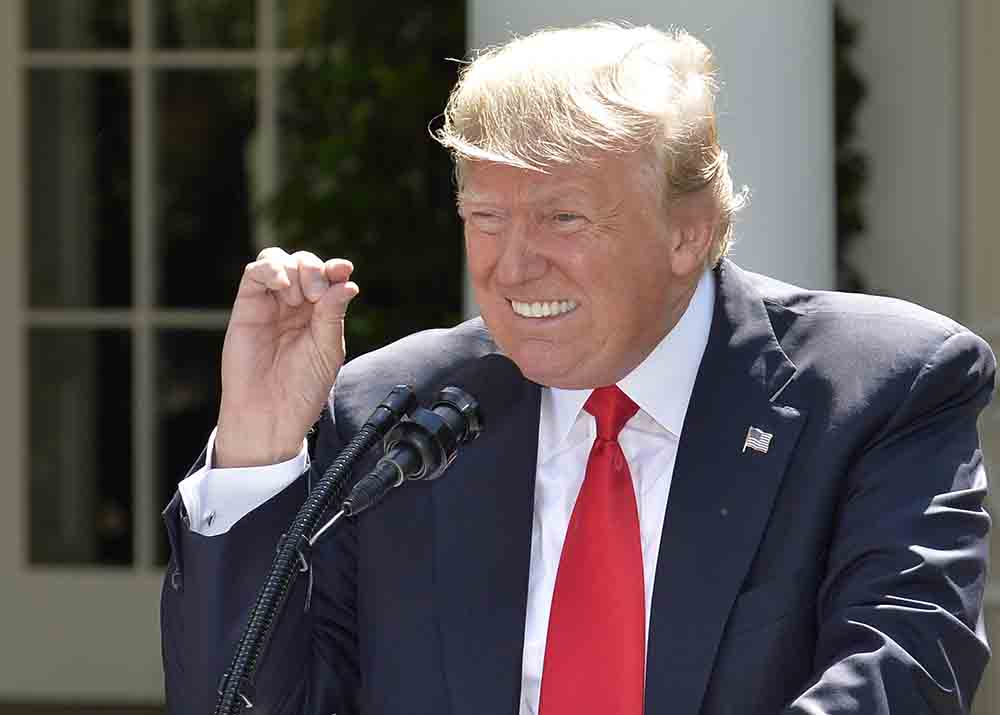Media Report

- The New York Times comments: "President Trump has managed to turn America First into America Isolated. In pulling out of the Paris climate accord, Mr. Trump has created a vacuum of global leadership that presents ripe opportunities to allies and adversaries alike to reorder the world's power structure. His decision is perhaps the greatest strategic gift to the Chinese, who are eager to fill the void that Washington is leaving around the world on everything from setting the rules of trade and environmental standards to financing the infrastructure projects that give Beijing vast influence...'The irony here is that people worried that Trump would come in and make the world safe for Russian meddling,' said Richard N. Haass, the president of the Council on Foreign Relations, who was briefly considered, then rejected, for a top post in the new administration. 'He may yet do that,' Mr. Haass added, 'but he has certainly made the world safe for Chinese influence.'... for months the Chinese president has been stepping unto the breach, including giving speeches at the annual meeting of the World Economic Forum in Davos, Switzerland, that made it sound like China alone was ready to adopt the role of global standard-setter that Washington has occupied since the end of World War II."
- Reuters reports: "The European Union and China warned U.S. President Donald Trump on Friday he was making a major error by withdrawing from the Paris climate pact, but the pair failed to agree a formal climate statement because of divisions over trade. Speaking alongside Chinese Premier Li Keqiang, the EU's Donald Tusk said efforts to reduce pollution and combat rising sea levels would now continue without the United States. But a spat on trade and steel production underscored the differences in a sometimes difficult EU-China relationship...Despite what officials described as a warm meeting, China and the European Union could not agree on a broader final communique meant to focus on a range of other issues discussed at the talks, including a commitment to free trade and measures needed to reduce a global steel glut. The leaders' news conference was delayed for three hours as they sought to find agreement. According to one person present at the summit, China's insistence on a reference that the European Union will eventually recognize China as an economy driven by the market, not the state, blocked the final 60-point statement. That also meant there could be no agreement on a formal pledge to work together to reduce global steel production."
- The Wall Street Journal reports: "The decision by the People's Bank of China to sharply increase the value of the yuan against the dollar at its daily fixing Thursday surprised many investors, particularly those in the West who have long valued state-directed currency movements less for their immediate direction than for signs of the underlying policy that the central bank appears to be pursuing. In this case, many investors said they believed China was seeking to build confidence in its economy at a time of deepening concern about the possible ripple effects from a long-running debt buildup and a state crackdown on loose lending in certain sectors. Those concerns were intensified in April, when capital outflows were estimated to have picked up after moderating in the first quarter. And last week, Moody's Investors Service downgraded China's sovereign-debt rating, the first such cut since 1989. At the same time, many investors said they continued to expect that China would succeed in its efforts to manage its way out of the debt buildup without significantly reducing its growth or increasing volatility in financial markets."
Calendar
- 2017-06-01 As U.S. retreats, EU and China seek climate leadership at summit
- 2017-05-31 China Gauge of Factory Activity Holds Steady in May
- 2017-05-30 A wild ride awaits Branstad in China
- 2017-05-26 China's reforms not enough to arrest mounting debt: Moody's
- 2017-05-26 China's reforms not enough to arrest mounting debt: Moody's
- 2017-05-25 U.S. Warship Sails Near Island Claimed by Beijing in South China Sea
- 2017-05-24 Larry Summers: Trump’s ‘China deal’ is only a good deal for China
- 2017-05-23 Google AI beats Chinese master in ancient game of Go
- 2017-05-22 China and India Make Big Strides on Climate Change
- 2017-05-21 China's Growth Engines Are Slowly Converging
News
- Reuters EU, China trade spat blocks climate statement
- The Wall Street Journal China Steps Up Support for Its Currency
- MIT Technology Review China's Unprecedented Cyber Law Signals Its Intent to Protect a Precious Commodity: Data
- The Guardian In China, the water you drink is as dangerous as the air you breathe
- NPR China Steps Forward As Unlikely Leader In Fight Against Climate Change
- Reuters Chinese insurer Anbang denies report that chairman not able to leave China
- The New York Times Trump Awarded a New Chinese Trademark, This Time for Catering
- NPR Australia's Loyalties Are Shifting From The U.S. To China
- The Washington Post Family says Chinese human rights activist formally arrested
- The Financial Times Billionaire Anbang boss Wu Xiaohui barred from leaving China
- The Washington Post Chinese media says 'selfish and irresponsible' Trump has crippled U.S. leadership
- The Wall Street Journal Crippling China Delivery Dispute Is All About the Data
- The Financial Times China ready to cash in on rise of machine learning
Commentary
- The New York Times: Opinions Trump Hands the Chinese a Gift: The Chance for Global Leadership
- The Diplomat Why Is China Downgrading Participation in the Shangri-La Dialogue?
- Wired Google is Already Late to China's AI Revolution
- Forbes Chinese Influence At Harvard, And The Proposed Pro-China Unified Korea
- Foreign Policy China Won't Hand the U.S. Navy Victory Like Japan Did
- Quartz The world is sitting on a $400 trillion financial time bomb
- The National Interest China and Russia Hate America's Missile Defense Systems for a Very Simple Reason
